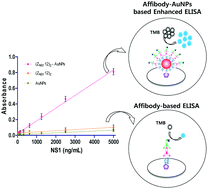当前位置:
X-MOL 学术
›
New J. Chem.
›
论文详情
Our official English website, www.x-mol.net, welcomes your feedback! (Note: you will need to create a separate account there.)
Sensitive detection of dengue virus NS1 by highly stable affibody-functionalized gold nanoparticles†
New Journal of Chemistry ( IF 3.3 ) Pub Date : 2018-06-21 00:00:00 , DOI: 10.1039/c8nj02244e Jinho Bang 1, 2, 3, 4, 5 , Heesun Park 1, 2, 3, 4 , Won Il Choi 1, 2, 3, 4 , Daekyung Sung 1, 2, 3, 4 , Jin Hyung Lee 1, 2, 3, 4 , Kuen Yong Lee 4, 5, 6, 7 , Sunghyun Kim 1, 2, 3, 4
New Journal of Chemistry ( IF 3.3 ) Pub Date : 2018-06-21 00:00:00 , DOI: 10.1039/c8nj02244e Jinho Bang 1, 2, 3, 4, 5 , Heesun Park 1, 2, 3, 4 , Won Il Choi 1, 2, 3, 4 , Daekyung Sung 1, 2, 3, 4 , Jin Hyung Lee 1, 2, 3, 4 , Kuen Yong Lee 4, 5, 6, 7 , Sunghyun Kim 1, 2, 3, 4
Affiliation

|
Infection with dengue virus (DENV) is a serious health issue that causes severe dengue fever and occasionally lethal complications, such as dengue hemorrhagic fever. Therefore, rapid and sensitive DENV detection is important to reduce morbidity and mortality. Here, we screened dengue NS1-specific affibodies and developed highly stable anti-NS1 affibody-functionalized AuNPs to improve the detection sensitivity of the NS1 antigen in ELISA. First, we screened NS1 antigen-specific affibody molecules (ZNS112, ZNS116, and ZNS146) from an affibody phage library. The affibodies were then expressed and purified from Escherichia coli. Among them, the ZNS112 affibody showed the highest equilibrium binding constant (Kd) of 1 μM and was sufficiently stable at high temperatures. This affibody was functionalized on AuNPs measuring 20 nm in diameter, which were used as carriers to achieve amplification of the signal in ELISA. The developed anti-NS1 affibody-functionalized AuNPs ((ZNS112)2–AuNP) showed good properties, such as easy synthesis, a high number of affibody conjugations on the AuNPs, and excellent stability under harsh conditions with high salt concentrations and temperature. In addition, this nanoparticle-based enhanced ELISA resulted in a 14.2-fold signal amplification performance for dengue NS1 detection in comparison with the affibody-based ELISA. This novel and sensitive method using (ZNS112)2–AuNPs may have applications in the detection of DENV in infected patients at an early stage and for the detection of other pathogens in clinical diagnostics.
中文翻译:

高度稳定的亲和体功能化金纳米颗粒灵敏地检测登革热病毒NS1 †
登革热病毒(DENV)感染是一个严重的健康问题,会导致严重的登革热和偶发致命性并发症,例如登革出血热。因此,快速灵敏的DENV检测对于降低发病率和死亡率很重要。在这里,我们筛选了登革热NS1特异性亲和体,并开发了高度稳定的抗NS1亲和体功能化AuNP,以提高ELISA中NS1抗原的检测灵敏度。首先,我们从亲和体噬菌体库中筛选了NS1抗原特异性亲和体分子(Z NS1 12,Z NS1 16和Z NS1 46)。然后表达亲和体并从大肠杆菌纯化。其中,Z NS1 12亲和体显示出最高的平衡结合常数(K d)为1μM,并且在高温下足够稳定。该亲和体在直径20 nm的AuNPs上功能化,用作载体以实现ELISA中信号的放大。已开发的抗NS1亲和体官能化的AuNPs((Z NS1 12)2 –AuNP)显示出良好的性能,如易于合成,AuNPs上大量的亲和体结合,以及在高盐浓度和高温条件下在苛刻条件下的出色稳定性。此外,与基于亲和抗体的ELISA相比,这种基于纳米颗粒的增强型ELISA在登革热NS1检测中产生了14.2倍的信号放大性能。使用(Z NS1 12)2的这种新颖而灵敏的方法–AuNPs可能会在早期阶段用于感染患者的DENV检测,并在临床诊断中用于检测其他病原体。
更新日期:2018-06-21
中文翻译:

高度稳定的亲和体功能化金纳米颗粒灵敏地检测登革热病毒NS1 †
登革热病毒(DENV)感染是一个严重的健康问题,会导致严重的登革热和偶发致命性并发症,例如登革出血热。因此,快速灵敏的DENV检测对于降低发病率和死亡率很重要。在这里,我们筛选了登革热NS1特异性亲和体,并开发了高度稳定的抗NS1亲和体功能化AuNP,以提高ELISA中NS1抗原的检测灵敏度。首先,我们从亲和体噬菌体库中筛选了NS1抗原特异性亲和体分子(Z NS1 12,Z NS1 16和Z NS1 46)。然后表达亲和体并从大肠杆菌纯化。其中,Z NS1 12亲和体显示出最高的平衡结合常数(K d)为1μM,并且在高温下足够稳定。该亲和体在直径20 nm的AuNPs上功能化,用作载体以实现ELISA中信号的放大。已开发的抗NS1亲和体官能化的AuNPs((Z NS1 12)2 –AuNP)显示出良好的性能,如易于合成,AuNPs上大量的亲和体结合,以及在高盐浓度和高温条件下在苛刻条件下的出色稳定性。此外,与基于亲和抗体的ELISA相比,这种基于纳米颗粒的增强型ELISA在登革热NS1检测中产生了14.2倍的信号放大性能。使用(Z NS1 12)2的这种新颖而灵敏的方法–AuNPs可能会在早期阶段用于感染患者的DENV检测,并在临床诊断中用于检测其他病原体。



























 京公网安备 11010802027423号
京公网安备 11010802027423号